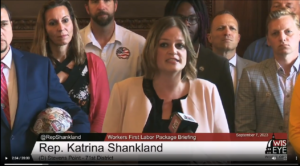
In this update:
- Supreme Court Updates
- Administration Updates
- Legislative Updates
- Election Updates
- A Look at the Week Ahead
Supreme Court Updates
Republicans consider impeaching Protasiewicz, Dems launch counter effort
 This week, the Democratic Party of Wisconsin announced a new effort to pressure Republican lawmakers to not impeach liberal state Supreme Court Justice Janet Protasiewicz. Called “Defend Justice” the $4 million campaign includes voter outreach efforts through doors, text messages, and public events, as well as a multi-million dollar ad campaign. The initiative also features a website that tracks where each individual lawmaker stands on the possibility of impeaching Justice Protasiewicz. According to DPW Chair Ben Wikler, the effort will receive $1 million in funding from the Democratic party with the remaining $3 million coming from outside groups. A Better Wisconsin Together has said it will be part of the effort, but other groups have not yet been identified. “Everyone will know what Republicans are trying to do in this moment,” Mr. Wikler said at a press conference announcing the campaign. “If they try to abuse and break our Constitution, to impeach Janet Protaseiwicz, they will reap the whirlwind.” Meanwhile, Assembly Speaker Robin Vos (R) said the advocacy campaign proves “Justice Protasiewicz and the Democrat Party are one and the same,” and that Republicans expect her to “recuse herself from handling a case where she has pre-decided the outcome and the Democrat party is fully involved.” Read below for details on how impeachment became front and center in Wisconsin politics.
This week, the Democratic Party of Wisconsin announced a new effort to pressure Republican lawmakers to not impeach liberal state Supreme Court Justice Janet Protasiewicz. Called “Defend Justice” the $4 million campaign includes voter outreach efforts through doors, text messages, and public events, as well as a multi-million dollar ad campaign. The initiative also features a website that tracks where each individual lawmaker stands on the possibility of impeaching Justice Protasiewicz. According to DPW Chair Ben Wikler, the effort will receive $1 million in funding from the Democratic party with the remaining $3 million coming from outside groups. A Better Wisconsin Together has said it will be part of the effort, but other groups have not yet been identified. “Everyone will know what Republicans are trying to do in this moment,” Mr. Wikler said at a press conference announcing the campaign. “If they try to abuse and break our Constitution, to impeach Janet Protaseiwicz, they will reap the whirlwind.” Meanwhile, Assembly Speaker Robin Vos (R) said the advocacy campaign proves “Justice Protasiewicz and the Democrat Party are one and the same,” and that Republicans expect her to “recuse herself from handling a case where she has pre-decided the outcome and the Democrat party is fully involved.” Read below for details on how impeachment became front and center in Wisconsin politics.
Why is impeachment being discussed?
During the 2023 campaign for state Supreme Court, the liberal candidate, Janet Protasiewicz, called the state’s legislative maps “rigged” and on a different occasion said she would “enjoy taking a fresh look at the gerrymandering question.” Judge Protasiewicz further commented that the maps “do not reflect people in this state. I don’t think you could sell any reasonable person that the maps are fair… I can’t tell you what I would do on a particular case, but I can tell you my values, and the maps are wrong.” During the campaign, Judge Protasiewicz also received nearly $10 million in campaign contributions directly from the state’s Democratic Party and pledged to recuse herself from any case DPW was party to. However, she also said she would not recuse herself from cases involving parties that advocate for Democrats, and that she’d still hear cases involving abortion or redistricting.
Judge Protasiewicz was elected by an 11-point margin in April and the day after her official investiture in August, a lawsuit was filed seeking to overturn the state’s Republican-drawn legislative maps. The lawsuit could have significant ramifications for the balance of power in the state legislature and could potentially upend the Republican majority in the Assembly and supermajority in the Senate. The suit not only asks for the lines to be redrawn, it also seeks to force all 33 members of the state Senate to run for re-election in 2024. That would mean all 132 legislators would be up for election in 2024. A little over a week after the lawsuit was filed, Speaker Vos said on a radio show that if Justice Protasiewicz did not recuse herself from the cases involving the maps, the legislature might consider impeaching her. “If there’s any semblance of honor on the state Supreme Court left, you cannot have a person who runs for the court prejudging a case and being open about it, and then acting on the case as if you’re an impartial observer,” Speaker Vos said. “I want to look and see, does she recuse herself on cases where she has prejudged? That to me is something that is at the oath of office and what she said she was going to do to uphold the Constitution. That to me is a serious offense.”
What is the law on recusal?
There are two types of recusal standards in Wisconsin: state and federal. According to the U.S. Constitution’s due process clause, a judge must recuse if they have a financial interest in the case, or if there is a strong possibility of bias. Meanwhile, there are state rules that require recusal when a judge’s impartiality can reasonably be questioned. Examples of situations that would require recusal would be if the judge made a statement as a candidate that “commits, or appears to commit” the judge with respect to an issue in the proceeding or if the judge or an immediate family member has a significant financial interest in the case’s outcome. However, in 2010, the state Supreme Court adopted rules that say a judge “shall not be required” to recuse based solely on an endorsement or campaign contribution. Moreover, the Supreme Court ruled in 2011 that it’s up to an individual justice to decide whether they must recuse from a case and that a majority of justices cannot force a colleague off a case.
How does impeachment work in Wisconsin?
Wisconsin’s Constitution allows “civil officers” to be impeached and removed for corrupt conduct in office or for committing a crime. The impeachment process starts in the Assembly where a simple majority must vote to impeach. There are 99 members of the Assembly, and assuming all members are present for the vote, 50 members would need to vote in favor of impeachment. Republicans currently hold 64 seats in the Assembly while Democrats hold 35. Once the Assembly votes with a simple majority in favor of impeachment, the official is immediately prohibited from performing the duties of their office. That means Justice Protasiewicz would not be allowed to rule on any case if the Assembly votes to impeach. Following an impeachment vote in the Assembly, the Senate holds a trial and vote on whether to convict. A conviction requires two-thirds of the senators present to vote in favor of conviction. There are 33 members of the Senate, and assuming all members are present for the vote, 22 members would need to vote to convict. Republicans currently hold 22 seats in the Senate — a supermajority — while Democrats hold 11 seats. If the Senate convicts Justice Protasiewicz, she would be removed from office and Governor Tony Evers (D) would appoint a replacement.
What is the current situation?
In addition to the $4 million advocacy campaign announced by DPW, two complaints filed with the state’s Judicial Commission alleging Justice Protasiewicz engaged in unethical conduct by prejudging cases have been dismissed. The Commission said its “examination of this matter has resulted in a determination that there is no evidence of misconduct.” In a separate letter to Justice Protasiewicz, the Commission noted its proceedings are confidential pursuant to state law and that it had considered judicial rules and case law in making its final determination. Responding to the dismissal, Speaker Vos said “The Judicial Commission’s memo… only muddies the waters. The Judicial Commission decided Justice Protasiewicz could not be sanctioned for what she said on the campaign trail. The Commission did not address whether she can sit on a case after accepting $10 million in campaign funds from the Democrat Party—the interested party in the redistricting case. Nor did they address whether she may sit on a case having made commitments for how she would rule that are inconsistent with the obligation to be impartial.”
What are Democratic lawmakers saying?
In response to the threat of impeachment, the Assembly Democratic Caucus and the Senate Democratic Caucus released the following joint statement:
“Earlier this year, Justice Janet Protasiewicz was elected by the people of Wisconsin. Now, legislative Republicans, in an unprecedented attempt to override the will of voters, are threatening to impeach Justice Protasiewicz before she has the opportunity to hear a single case. Legislative Democrats are united in our opposition to this anti-democratic abuse of power. Legislative Republicans have threatened to nullify more than a million votes for a duly elected justice in order to hold onto their power and deny Wisconsinites access to reproductive rights. This is an affront to democracy, and it will not stand. Attempting to change the rules to hold onto power is nothing new for Speaker Vos and legislative Republicans, as we’ve seen through their gerrymandered maps, changes to election law, and lame duck session stripping Governor Evers and Attorney General Josh Kaul of their powers. However, this impeachment threat demonstrates that we have not yet reached the limit of their willingness to undermine the core values of our republic. We will do everything in our power to prevent this egregious effort to undermine our democracy.”
Administration Updates
Evers says he’ll veto GOP tax cut

Governor Tony Evers (D) has promised to veto the Republican-proposed $3 billion tax cut and expansion of the retirement income tax break. The bill, AB 386, would reduce income taxes for the third-highest tax bracket to 4.4% from 5.3%, while also expanding an existing tax break on retirement income. “I’ll veto it. Plain and simple,” Gov. Evers posted to Twitter. The governor maintained the tax cut bill would lead the state into bankruptcy, writing “I’m not going to sign an irresponsible Republican tax cut that jeopardizes our state’s financial stability well into the future and the investments we need to be making today to address the real, pressing challenges facing our state.” In the same tweet, Gov. Evers also pointed out that Republicans rejected a tax cut plan that he had previously proposed in his executive budget. “I delivered on my promise of proposing a 10% middle class tax cut that provided $1.2 billion in targeted tax relief to working families, seniors, caregivers, parents, and veteran families because I believe that when we deliver tax relief, we should do it responsibly. Republicans rejected my commonsense tax plan that would’ve kept taxes low now and into the future without driving our state into debt or causing devastating cuts to priorities like public schools, child care, public safety, and fixing our roads and bridges.”
Gov. Evers’ tweet came just prior to an executive session of the Assembly Ways and Means Committee, where the committee eventually voted 7-3 in favor of advancing the Republican tax cut proposal to the full Assembly. Democratic Rep. Tod Ohnstad joined all Republican committee members in support of the bill, despite concerns he had about the sustainability of the tax cuts. Democrats on the committee who voted against the proposal pointed to an analysis from the Legislative Fiscal Bureau, which predicted the cuts could result in a general fund structural imbalance of $651 million in 2025-2026. However, the chairman of the committee, Rep. John Macco (R), called that argument a “red herring” because the analysis assumed revenue and spending will remain the same in the future. “It’s a misnomer, and a misunderstanding of how the budgetary process works,” Rep. Macco said.
AB 386 will now receive a floor vote in the Assembly on Tuesday, September 12, and likely a Senate floor vote on Thursday, September 14. If the Assembly and Senate pass the same version of the bill, it would then go to Gov. Tony Evers, who has promised to veto it.
Legislative Updates
Dems announce “Workers First” legislative package

The Legislative Democratic Labor Workgroup announced the “Workers First” legislative package, a series of 10 bills that, according to Senate Minority Leader Melissa Agard (D), “seek to prioritize Wisconsin’s workers and repeal a number of Walker-era anti-labor policies.” Bill authors include Democratic Rep. Chris Sinicki, Rep. Katrina Shankland, Rep. Tod Ohnstad, Rep. Jimmy Anderson, Rep. Marisabel Cabrera, and Rep. Lisa Subeck. Among other provisions, the legislative package would:
- Reinstate collective bargaining rights for public employees;
- Repeal the right-to-work law;
- Provide a uniform prevailing wage;
- Restore project labor agreements;
- Prohibit non-compete agreements in worker contracts;
- Allow for enactment of local ordinances that provide family and medical leave, as well as a local minimum wage.
Rep. Sinicki said the legislative package focuses on “fair wages, good benefits, workplace protections, and a high quality of life,” while Rep. Shankland pointed to recent victories for organized labor across the state and nation. Rep. Shankland said “This shows that people are increasingly recognizing the value of labor unions and understand that when workers win, everyone wins.” Rep. Ohnstad mentioned the state’s demographic decline and the need for more workers, saying “We believe that as Wisconsin continues to experience a severe workforce shortage, it is crucial that the state government advance pro-worker policies to help recruit and retain a skilled workforce.”
Republican leadership have yet to comment publicly on the proposed legislative package.
Election Updates
Tara Johnson announces bid for 3rd CD
 This week, former La Crosse County Board Supervisor Tara Johnson joined the 2024 race for Wisconsin’s 3rd Congressional District to challenge U.S. Representative Derrick Van Orden (R). Ms. Johnson is the third candidate seeking the Democratic nomination, joining Rebecca Cooke, a nonprofit owner from Eau Claire, and Adam Nytes, a Harvard University student moving to La Crosse in spring. State Representative Katrina Shankland is also currently considering joining the race and being the 4th candidate in the primary.
This week, former La Crosse County Board Supervisor Tara Johnson joined the 2024 race for Wisconsin’s 3rd Congressional District to challenge U.S. Representative Derrick Van Orden (R). Ms. Johnson is the third candidate seeking the Democratic nomination, joining Rebecca Cooke, a nonprofit owner from Eau Claire, and Adam Nytes, a Harvard University student moving to La Crosse in spring. State Representative Katrina Shankland is also currently considering joining the race and being the 4th candidate in the primary.
Ms. Johnson said she decided to launch a bid because the seat is “represented by an extremist who does not reflect the values of this district.” Ms. Johnson said she plans to focus on health care and reproductive rights as key matters while running. She is currently endorsed by Deb McGrath, a former Army and CIA officer who ran for the seat in 2022 and finished third in the Democratic primary. Ms. Johnson previously held a position on the La Crosse County Board of Supervisors from 2000-2020, including nine years as chairwoman. Since leaving the county board, Ms. Johnson has been a volunteer on the board of directors of the La Crosse Community Foundation, as well as the board of the La Crosse County Democrats.
Responding on Ms. Johnson’s campaign announcement, National Republican Campaign Committee Spokesman Will Reinert said “Extreme Democrat Tara Johnson is just another rubber stamp for Joe Biden and his inflationary agenda. Rep. Derrick Van Orden is working hard to lower inflation, protect our border and decrease gas prices. He will be re-elected resoundingly next fall.” Rep. Van Orden was last elected in 2022 with 51.8% of the vote, defeating his Democratic opponent Brad Pfaff by a margin of 3.7 percentage-points.



